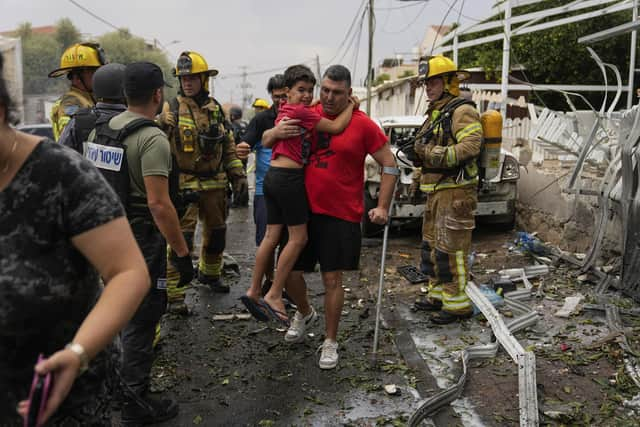'My husband turned to me and said: There is a war’
When an air raid siren went off at 6.30 on Saturday morning, Tal woke up her family and headed immediately for the bomb shelter in the basement of their home in a city outside Tel Aviv.
"We woke up because we had an alarm and we had to run to the bomb shelter," says Tal, a dancer who performed at the Edinburgh Fringe last year.
Advertisement
Hide AdAdvertisement
Hide Ad“We sat there and there was nothing on the news, we didn’t know what was happening. Then my husband started to look at [social media site] Telegram and he turned to me and said ‘There is a war’."


More than 700 people have now been killed in Israel after Hamas militants launched an attack from Gaza. A counter attack from Israel has left a further 500 Palestinians dead. Israeli military said on Monday it has carried out one of the "largest ever air strikes against Hamas in Gaza".
A child during the Gulf War in 1991, this weekend’s air raid alert brought back memories for Tal of a month of regular air raids and mandatory gas mask drills.
"Sadly, we are used to it,” she said. “My uncle died in the Yom Kippur war in 1973. It was just yesterday that we marked 50 years from his day of death. I wasn't born yet, but my mother is still traumatised from that and now here we are, heading into another who-knows-how-many years of agony.”
Tal, who performed a one-woman show at the Fringe in 2022, said her cousin had been at the music festival on the border with Gaza that was stormed by Hamas militants, who killed 260 revellers and abducted more. He escaped after taking weapons from dead militants to defend himself.
"My cousin was at the party [festival],” she said. “He was running from them [the militants] and he said he saw some militants that they thought were dead, so they took their
guns and they shot them back and they fought them. He is safe.”
Tal's own family, including her five year old daughter, have had to take cover in bomb shelters amid regular air raid alarms over the past three days.
Advertisement
Hide AdAdvertisement
Hide Ad“My daughter is climbing the walls, she wants to go outside and meet with her friends,” she said. Kindergartens and schools in Israel are closed at the moment, with some students moving to online learning.
"Her kindergarten teacher has phoned and today they had a class Zoom call all together,” she said. “I have used the word ‘war’ with her, she has seen the television when we have been watching it, but I am lucky, she is young and doesn’t ask too many questions. At the weekend, her cousin was here, she is seven and she was very scared.”
Tanks and drones were deployed at the weekend to guard breaches in the border fence with Gaza to prevent new militant incursions. Thousands of Israelis were evacuated from more than a dozen towns near Gaza, and the military summoned 300,000 reservists - a massive mobilisation in a short time.
Tal added: “My brothers are in the Israeli military and one is in the south, so I am very worried.”
Ayelet de Picciotto is a psychotherapist from central Israel, who is offering her services remotely to those in the south of the country who are worst affected by the weekend’s attacks.
"The spirit of the people is very strong,” she said. “People are helping each other. And each of us gives what they can, whether it's donations with equipment to those who are left without a home or whether it is professional help coping with the traumatic events. We are in the middle of a war. All of the time, you don't know where the next [rocket attack] will happen. We are defending our home.
"What happened, these events, are really difficult to contain and comprehend. I can really try to help as much as possible and as soon as possible not to let the traumatic events become paralysing.”
She added: "Israel is very small.When things that happen, they are one hour or two hours from the centre. It's very close geographically. So we feel it, we feel it physically and we feel it emotionally and we are all very connected.”
Advertisement
Hide AdAdvertisement
Hide AdShe said usually busy city streets were generally empty as people adjust to a war footing.
"The streets are mostly empty, there is very little traffic or people on the streets,” she said. “Some coffee houses are open, although many stores are shut. It is our discretion where to go, but we need to take into account that there must be a shelter close by wherever we are, so we can take refuge there from the missile attack. People are going out but very small numbers comparing to routine times.”
She added: "This is how the streets looked during Covid and in Israel every time we have an army operation, so it's not a new scene for us, but it’s a sad scene and part of the coping is accepting the facts and really choosing how we can help ourselves and how we can help people.”
In Gaza, where more than 65 per cent of people already live below the poverty line and 60 per cent are unemployed, according to the United Nations, aid organisations have warned of an escalating humanitarian emergency.
Israel has launched one of its largest ever air attacks on the territory in response to the surprise Hamas assault.
“We’re used to the banging and pounding and horror and the fear of our children,” one Gaza resident told the New York Times.
Comments
Want to join the conversation? Please or to comment on this article.
